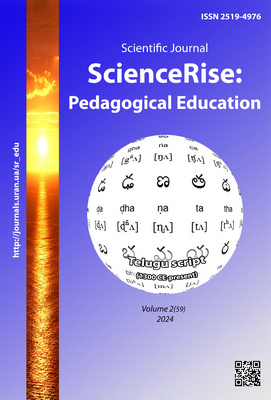Analysis of the effectiveness of the methodology for designing a cloud-oriented distance learning environment for biology in informal education conditions
DOI:
https://doi.org/10.15587/2519-4984.2024.303977Keywords:
cloud-oriented environment, distance learning of biology, design methodology, factor-criterion modelAbstract
The article contains an analysis of research on the design of a cloud-oriented environment for distance learning of biology, teachers' experience in designing cloud-oriented environments contributes to the development of distance learning forms in general secondary education institutions and the widespread implementation of electronic tools in educational practice. When organizing distance learning in natural sciences, it is necessary to take into account the platform's capabilities and services for developing students' natural-science thinking, conducting observations, laboratory and practical experiments, implementing experimental tasks. The combination of cloud services and methods of distance learning in biology allows visualization of biological processes, the research-oriented nature of activities, organizing research projects on a single platform, using media resources, interactive simulators, integrating virtual content with the physical environment, and using programs for quality knowledge monitoring. The aim of the study is to develop a methodology for teachers to design a cloud-oriented educational environment for distance learning of biology for students in informal education conditions, testing its effectiveness based on the results of evaluation using a factor-criterion model, and developing recommendations for improving the qualifications of teachers in designing cloud-oriented environments in informal education conditions. Theoretical and empirical methods were applied to achieve the set goal, involving the study of previous research in the field of designing distance educational environments and the integration of cloud services into the educational process. Mathematical statistical methods were used to analyze the results of the survey of teachers from the focus group. The effectiveness of the developed methodology was tested using a factor-criterion model, which includes four factors: organizational, methodological, procedural, and content. Expert assessment of the effectiveness of the methodology revealed that the effectiveness of designing a cloud-oriented environment for distance learning of biology by biology teachers in general secondary education institutions, who participated in the focus group, is 0.79, indicating a high level
References
- Monitorynh yakosti orhanizatsii dystantsiinoho navchannia u zakladakh zahalnoi serednoi osvity (2022). Derzhavna sluzhba yakosti osvity Ukrainy. Available at: https://sqe.gov.ua/diyalnist/monitoringovi-doslidzhennya/monitoring-yakosti-organizacii-dista/
- Lytvynova, S. H. (2016). Teoretyko-metodychni osnovy proektuvannia khmaro oriientovanoho navchalnoho seredovyshcha zahalnoosvitnoho navchalnoho zakladu [Doctoral dissertation].
- Spirin, O. M., Kolos, K. R. (2020). Technology for organization of distance learning for students in quarantine conditions on the basis of the moodle platform. Information Technologies and Learning Tools, 79 (5), 29–58. https://doi.org/10.33407/itlt.v79i5.4090
- Ovcharuk, O. V. (2023). Monitoring the readiness of teachers to use digital tools during the war in Ukraine. Information Technologies and Learning Tools, 98 (6), 52–65. https://doi.org/10.33407/itlt.v98i6.5478
- Shyshkina, M., Nosenko, Yu. (2022). Cloud technologies of open science in the process of continuous training of ICT in education. Physical and Mathematical Education, 37 (5), 69–74. https://doi.org/10.31110/2413-1571-2022-037-5-010
- Vodopian, N. I. (2023). Design of a cloud-oriented environment for distance learning of biology in general secondary education institutions. Innovate Pedagogy, 1 (57), 236–244. https://doi.org/10.32782/2663-6085/2023/57.1.47
- Kukharenko, V. M., Bondarenko, V. V. (2020). Ekstrene dystantsiine navchannia v Ukraini. Kharkiv: Vyd-vo KP "Miska drukarnia", 409.
- Lytvynova, S. (2014). Cloud computing, virtualization, mobility ― the main directions of development of general secondary education of the XXI century. Pedahohika vyshchoi ta serednoi shkoly, 40, 206–213.
- Bykov, Yu., Shyshkina, M. P. (2016). Teoretyko-metodolohichni zasady formuvannia khmaro oriientovanoho seredovyshcha vyshchoho navchalnoho zakladu. Teoriia i praktyka upravlinnia sotsialnymy systemamy, 2, 30–52.
- Vakaliuk, T. A. (2013). Mozhlyvosti vykorystannia khmarnykh tekhnolohii v osviti. Aktualni pytannia suchasnoi pedahohiky. Kherson: Vydavnychyi dim «Helvetyka», 97–99.
- Viina ta osvita. Bryf za rezultatamy doslidzhennia (2024). Kyiv, 38. Available at: https://mon.gov.ua/storage/app/media/news/2024/02/10/Bryf.Viyna.ta.osvita.Dva.roky.povnomasshtabnoho.vtorhnennya.2024.ukr-10.02.2024.pdf
- Ohiienko, O. I. (2012). Dystantsiina pedahohichna osvita: zarubizhnyi ta vitchyznianyi dosvid. Kyiv: Instytut pedahohichnoi osvity i osvity doroslykh NAPN Ukrainy.
- Yelnykova, H. V., Riabova, Z. V. (2008). Monitorynh yak efektyvnyi zasib otsiniuvannia yakosti zahalnoi serednoi osvity v navchalnomu zakladi. Obrii, 1 (26), 5–12.
- Resnik, S. (2022). Toolkit for internal audit of the educational activities of the institution of general secondary education. Academic Notes Series Pedagogical Science, 1 (204), 167–172. https://doi.org/10.36550/2415-7988-2022-1-205-167-172
- Khytko, M., Kulyk, A. (2022). Global experience of development of distance forms of education. Visnyk Dniprovskoi akademii neperervnoi osvity "Publichne upravlinnia ta administruvannia", 1 (2), 72–78.
- Lytvynova, S. H., Vodopian, N. I. (2021). Pidhotovka vchyteliv do proektuvannia khmaro oriientovanoho seredovyshcha dystantsiinoho navchannia v umovakh neformalnoi osvity. Neperervna osvita: aktualni dyskursy. Uzhhorod: ZIPPO. 102–105.
- Marienko, M. (2020). The Current State of using the Cloud-based Systems of Open Science by Teachers of General Secondary Education. Proceedings of the 1st Symposium on Advances in Educational Technology, 2, 466–472. https://doi.org/10.5220/0010932900003364
Downloads
Published
How to Cite
Issue
Section
License
Copyright (c) 2024 Nataliia Vodopian, Svitlana Lytvynova

This work is licensed under a Creative Commons Attribution 4.0 International License.
Our journal abides by the Creative Commons CC BY copyright rights and permissions for open access journals.
Authors, who are published in this journal, agree to the following conditions:
1. The authors reserve the right to authorship of the work and pass the first publication right of this work to the journal under the terms of a Creative Commons CC BY, which allows others to freely distribute the published research with the obligatory reference to the authors of the original work and the first publication of the work in this journal.
2. The authors have the right to conclude separate supplement agreements that relate to non-exclusive work distribution in the form in which it has been published by the journal (for example, to upload the work to the online storage of the journal or publish it as part of a monograph), provided that the reference to the first publication of the work in this journal is included.







